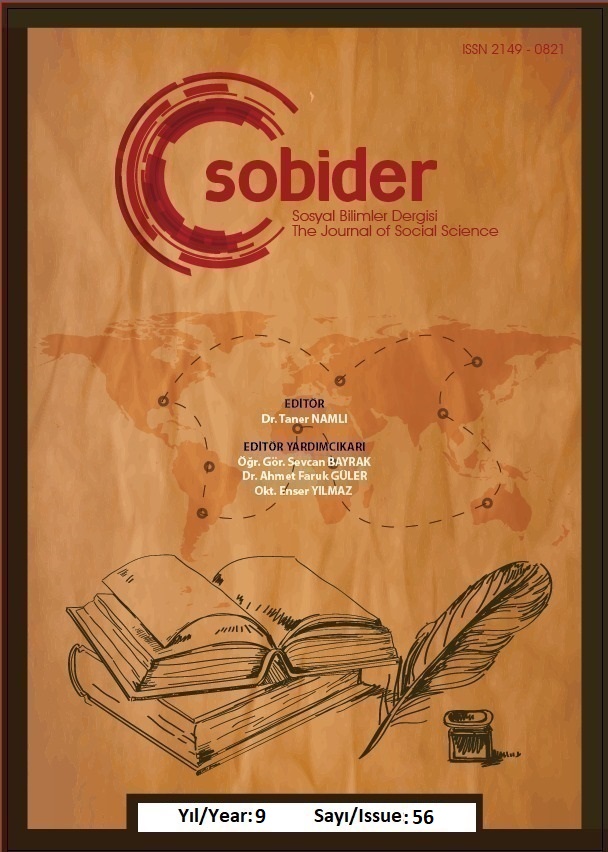Author :
Abstract
Vahiy, İslam dininin önemli kavramlarından birisidir. Bir kişinin Kur’ân yorumu ve algısından bahsedildiğinde, onun vahiy kavramına hangi manaları yüklediği önem arz etmektedir. Vahiy kavramı, kısaca Allah’ın emir ve yasaklarını birtakım yol ve yöntemlerle peygamberlerine ulaştırması, onlar aracılığıyla da kullarına özel bir yolla, gizli ve güvenli bir biçimde bildirmesi demektir. Oryantalistlerin İslam ve Hz. Peygamber hakkında yüzyıllardır yapmış oldukları çalışmalar birtakım önyargılara dayanmaktadır. Hz. Peygamber’in kişiliği, evlilikleri, gazve ve seriyyeleri tartışma konusu olmuş, Hz. Peygamber hakkında karalayıcı, yıpratıcı ve sağlıklı olmayan bir algı ortaya konulmaya çalışılmıştır. Bu olumsuz algının oluşmasına yol açan önemli bir itham da vahyin Hz. Peygamber’in ürünü olduğu iddiasıdır. Oryantalistlerin büyük çoğunluğu, vahyin kaynağını bir takım beşerî kaynaklarda aramaktadırlar. Vahyin kaynağı meselesinde, Hz. Muhammed’in etkilendiği kaynakları ele alırken oryantalizm öncesi önyargıların esiri olarak bazı ön kabulleri doğru kabul ederek bilimsellikten uzak bir değerlendirme içerisinde olmuşlardır. Bu çalışmada, vahyin kaynağı, oluşumu ve aktarımı konusunda bazı oryantalistlerin Hz. Peygamber hakkındaki değerlendirmeleri ve oluşturdukları vahiy algısının ortaya konulması hedeflenmektedir. Bazı etkili oryantalistlerin vahiy konusundaki eleştirileri ve düşünceleri bağlamında konu tartışılmaya çalışılacaktır. Bu amaçla, vahiy kavramı, anlam ve içerik değerlendirmeleri hakkında fikir edinmek adına, oryantalistlerden bir kısmının Hz. Peygamber’e gelen vahiyle ilgili görüşleri, değerlendirmeleri ve olaylara yaklaşım tarzları ele alınacaktır.
Keywords
Abstract
Revelation is one of the important concepts of the religion of Islam. When a person's interpretation and perception of the Qur'an is mentioned, it is important what meanings he attributes to the concept of revelation. The concept of revelation, in short, means that God conveys his orders and prohibitions to his prophets through certain ways and methods, and through them, he informs his servants in a secret and secure manner in a special way. The studies of orientalists about Islam and the Prophet for centuries are based on certain prejudices. The personality of the Prophet, his marriages, wars and seriyyes became the subject of discussion. It has been tried to reveal a defamatory, abrasive and unhealthy perception about the Prophet. Another important accusation that leads to the formation of this negative perception is the claim that the revelation is the product of the Prophet. The vast majority of orientalists look for the source of revelation in some human resources. While dealing with the sources that influenced Muhammad in the issue of the source of revelation, they accepted some pre-acceptances as the captive of pre-orientalist prejudices and made an unscientific evaluation. In this study, it is aimed to reveal the evaluations of some orientalists about the Prophet and the perception of revelation they created about the source, formation and transmission of revelation. The subject will be discussed in the context of the criticisms and thoughts of some influential orientalists on revelation. For this purpose, in order to get an idea of the concept of revelation, its meaning and content assessments, the opinions, assessments and approach to events related to the revelation that came to the Prophet by some of the orientalists will be discussed.
Keywords
- Akdemir, S. (1990). “Müsteşriklerin Kur’ȃn-ı Kerîm ve Hz. Muhammed (sav)’e Yaklaşımları”. Ankara Üniversitesi İlahiyat Fakültesi Dergisi 31 (198), 179-210.
- Aliyev, S. (2016). “Rus Oryantalistlerin Vahiy ile İlgili Görüşleri”. Gaziosmanpaşa Üniversitesi İlahiyat Fakültesi Dergisi 4 (2), 189-206.
- Apak, A. (2012). Anahatlarıyla İslam Öncesi Arap Tarihi ve Kültürü. İstanbul: Ensar Yayınları.
- Blachère, R. (1952). Le Problème de Mahomet, essai de biographie critique du fondateur de l’Islam. Paris: Press Universitaires de France.
- el-Cürcanî, S. (1997). Kitȃbü’t-Ta’rifât, Arapça-Türkçe Terimler Sözlüğü. ter. ve nşr. Arif Erkan. İstanbul: Bahar Yayınları, 1997.
- Çağatay, N. (1982). İslam Öncesi Arap Tarihi. Ankara: Ankara Üniversitesi İlahiyat Fakültesi Yayınları.
- Er, H. (2016). Oryantalistlerin Kur’ȃn Vahyi ve Kuran’ın Kaynağına Yönelik İddiaları. [Yayımlanmamış yüksek lisans tezi]. Konya: Necmettin Erbakan Üniversitesi Sosyal Bilimler Enstitüsü.
- Gaudefroy-Demombynes, M. (1969). Mahomet. Paris: Édition Albin Michel.
- Gökkır, B. (2004). “Oryantalist Literatürde Kur’ȃn’ın Kaynağı Tartışmalarının Kaynağı Disiplinlerarası Bir Yaklaşım”. Bilimname 5 (2), 61-74.
- Hafızoğlu, R. (2019). İngiliz Oryantalizminde Kur’ȃn Ayetlerinin Temellendirilmesi. [Yayımlanmamış yüksek lisans tezi]. İstanbul: İstanbul Üniversitesi Sosyal Bilimler Enstitüsü.
- Hakyemez, C. (2006). “Oryantalistlere Göre Hz. Muhammed”. İslami İlimler Dergisi 1(1), 161- 176.
- Işık, A. (2006). Bir Felsefî Problem Olarak Vahiy ve Mucize. Ankara: Elis Yayınları.
- İbn Manzûr, M. (1985). Lisȃnü’l-Arab. 18 Cilt. İran/Kum: Neşrü Edebi’l-Havze.
- el-İsfahânî, R. (2010). Müfredȃt-Kur’ȃn Kavramları Sözlüğü. mütercimler: Abdülbaki Güneş- Mehmet Yolcu. İstanbul: Çıra Yayınları.
- Mȃlik b. Nebî (1997). İdeolojik Savaş Ajanları. ter. Cemal Aydın. İstanbul: Timaş Yayınları.
- Metin, İ. (2015). Fransız Oryantalistlerin Siyer Literatüründe Hz. Muhammed İmajı (Maurice Gaudefroy-Demombynes, Régis Blachère ve Maxime Rodinson Örneği) [Yayımlanmamış doktora tezi]. Ankara: Ankara Üniversitesi Sosyal Bilimler Enstitüsü.
- ………,(2016), “Hz. Muhammed’in Risalet Öncesi Hayatına Yaklaşımlar: Fransızca Siyer Literatürü Örneği”, Hadis ve Siyer Araştırmaları Dergisi 2 (2), 83-103.
- Mevdûdî, E. (2019). Tarih Boyunca Tevhid Mücadelesi ve Hz. Peygamber’in Hayatı. İstanbul: Pınar Yayıncılık.
- Özsoy, N. D. (2019). Oryantalistik Kur’ȃn Çalışmaları ve İhlas Suresi. Ankara: Ankara Okulu
- Polat, H. (2019). Oryantalistlerin Kur’ȃn Vahyini Temellendirme Çalışmaları-Alman Öncüler: Gustav Weil ve Theodor Nöldeke Örneği-[Yayımlanmamış doktora tezi]. Atatürk Üniversitesi Sosyal Bilimler Enstitüsü.
- Rodinson, M. (1994). Mahomet. Paris: Éditions du Seuil.
- Sarıçam vd., İ.,-Özdemir, M.,-Erşahin, S. (2011). İngiliz ve Alman Oryantalistlerin Hz. Muhammed Tasavvuru. Ankara: Nobel Yayın Dağıtım.
- Tresmontant, C. (1969). Le Problème de la Révélation. Paris: Édition du Seuil.
- Yaşar, N. (2017). Oryantalistlere Göre Kur’ȃn’ın Kaynağı ve Metinleşmesi. Ankara: Ankara Okulu Yayınları.
- Zürkânî, M. A. (1995). Menâhilu’l-İrfan fî Ulûmi’l-Kur’ȃn. 2 Cilt. Beyrut: Dȃru’l-Kitȃbi’l Arabî.
- Yavuz, Y. Ş. (2012). “Vahiy”. Türkiye Diyanet Vakfı İslam Ansiklopedisi. 42/440-443. İstanbul: TDV Yayınları.
- ………., (ed.) (2018). Vahiy ve Peygamberlik. İstanbul: Kuramer Yayınları.
- Yılmaz, Y. (2019). “Batılı Münekkitler ve Dozy’nin Kur’ȃn-ı Kerîm, Vahiy ve Hz. Muhammed’e Yönelik Tenkitlerine Müslümanların Cevabı: Filibeli Ahmed Hilmi Örneği”. Dini Araştırmalar 22 (55). 77-95.





